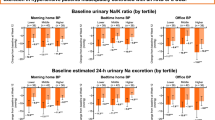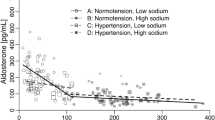Abstract
Previous work in mouse models shows that urinary TNF-α levels become elevated when dietary salt (NaCl) intake increases. To examine if this relationship exists in humans, we conducted a secondary analysis of the Dietary Approaches to Stop Hypertension (DASH)-Sodium trial to determine levels of urinary TNF-α in 367 subjects categorized by race, sex, and blood pressure. The DASH-Sodium trial is a multicenter feeding trial in which subjects were randomly assigned to either the DASH or control diet, and high, medium, and low sodium in random order. Multivariable linear regression was used to model baseline TNF-α and a mixed model was used to model TNF-α as a function of dietary intervention. At baseline, with all subjects on a “typical American diet”, urinary TNF-α levels were lowest in Black, p = 0.002 and male subjects, p < 0.001. After randomization to either the DASH or control diet, with increasing levels of sodium, urinary TNF-α levels increased only in subjects on the control diet, p < 0.05. As in the baseline analysis, TNF-α levels were highest in White females, then White males, Black females and lowest in Black males. The results indicate that urinary TNF-α levels in DASH-Sodium subjects are regulated by NaCl intake, modulated by the DASH diet, and influenced by both race and sex. The inherent differences between subgroups support studies in mice showing that increases in renal TNF-α minimize the extent salt-dependent activation of NKCC2.
This is a preview of subscription content, access via your institution
Access options
Subscribe to this journal
Receive 12 digital issues and online access to articles
$119.00 per year
only $9.92 per issue
Buy this article
- Purchase on Springer Link
- Instant access to full article PDF
Prices may be subject to local taxes which are calculated during checkout




Similar content being viewed by others
Data availability
The data that support the findings of this study are available from NHLBI and BioLINCC but restrictions apply to the availability of these data. Data are however available from the authors upon reasonable request and with permission of NHLBI and BioLINCC.
References
Sacks FM, Svetkey LP, Vollmer WM, Appel LJ, Bray GA, Harsha D, et al. Effects on blood pressure of reduced dietary sodium and the dietary approaches to stop Hypertension (DASH) Diet. N Engl J Med. 2001;344:3–10.
Gonzalez-Vicente A, Saez F, Monzon CM, Asirwatham J, Garvin JL. Thick Ascending Limb Sodium Transport in the Pathogenesis of Hypertension. Physiol Rev. 2019;99:235–309.
Jung J, Basile DP, Pratt JH. Sodium reabsorption in the thick ascending limb in relation to blood pressure: a clinical perspective. Hypertension (Dallas, Tex: 1979) 2011;57:873–9.
Caceres PS, Ortiz PA. Molecular regulation of NKCC2 in blood pressure control and hypertension. Curr Opin Nephrol Hypertens. 2019;28:474–80.
Herrera M, Ortiz PA, Garvin JL. Regulation of thick ascending limb transport: role of nitric oxide. Am J Physiol - Ren Physiol. 2006;290:F1279–84.
Mutig K. Trafficking and regulation of the NKCC2 cotransporter in the thick ascending limb. Curr Opin Nephrol Hypertens. 2017;26:392–7.
Monette MY, Rinehart J, Lifton RP, Forbush B. Rare mutations in the human Na-K-Cl cotransporter (NKCC2) associated with lower blood pressure exhibit impaired processing and transport function. Am J Physiol - Ren Physiol. 2011;300:F840–47.
Shahid M, Francis J, Majid DSA. Tumor necrosis factor-alpha induces renal vasoconstriction as well as natriuresis in mice. Am J Physiol - Ren Physiol. 2008;295:F1836–44.
Shahid M, Francis J, Matrougui K, Majid DSA. Involvement of tumor necrosis factor-alpha in natriuretic response to systemic infusion of nitric oxide synthase inhibitor in anesthetized mice. Am J Physiol - Ren Physiol. 2010;299:F217–24.
Battula S, Hao S, Pedraza PL, Stier CT, Ferreri NR. Tumor necrosis factor-alpha is an endogenous inhibitor of Na+-K+-2Cl- cotransporter (NKCC2) isoform A in the thick ascending limb. Am J Physiol - Ren Physiol. 2011;301:F94–100.
Hao S, Bellner L, Ferreri NR. NKCC2A and NFAT5 regulate renal TNF production induced by hypertonic NaCl intake. Am J Physiol - Ren Physiol. 2013;304:F533–42.
Hao S, Salzo J, Hao M, Ferreri NR. Regulation of NKCC2B by TNF-α in response to salt restriction. Am J Physiol - Ren Physiol. 2020;318:F273–82.
Hao S, Hao M, Ferreri NR. Renal-Specific Silencing of TNF (Tumor Necrosis Factor) Unmasks Salt-Dependent Increases in Blood Pressure via an NKCC2A (Na(+)-K(+)-2Cl(-) Cotransporter Isoform A-Dependent Mechanism. Hypertension (Dallas, Tex: 1979). 2018;1117–25.
Hao S, Salzo J, Zhao H, Hao M, Darzynkiewicz Z, Ferreri NR. MicroRNA-133a-dependent inhibition of proximal tubule angiotensinogen by renal TNF (Tumor Necrosis Factor). Hypertension 2020;76:1744–52.
Sabolic I, Asif AR, Budach WE, Wanke C, Bahn A, Burckhardt G. Gender differences in kidney function. Pflug Arch. 2007;455:397–429.
Tu W, Eckert GJ, Hannon TS, Liu H, Pratt LM, Wagner MA, et al. Racial differences in sensitivity of blood pressure to aldosterone. Hypertension 2014;63:1212–8.
Veiras LC, Girardi ACC, Curry J, Pei L, Ralph DL, Tran A, et al. Sexual Dimorphic Pattern of Renal Transporters and Electrolyte Homeostasis. J Am Soc Nephrol. 2017;28:3504–17.
Juraschek SP, Miller ER 3rd, Chang AR, Anderson CAM, Hall JE, Appel LJ. Effects of sodium reduction on energy, metabolism, weight, thirst, and urine volume: Results From the DASH (Dietary Approaches to Stop Hypertension)-Sodium Trial. Hypertension 2020;75:723–9.
Turban S, Thompson CB, Parekh RS, Appel LJ. Effects of sodium intake and diet on racial differences in urinary potassium excretion: results from the Dietary Approaches to Stop Hypertension (DASH)-Sodium trial. Am J Kidney Dis. 2013;61:88–95.
García NSH, Plato CF, Stoos BA, Garvin JL. Nitric oxide–induced inhibition of transport by thick ascending limbs from Dahl salt-sensitive rats. Hypertension. 1999;34:508–13.
Xu H, Chen H, Dong J, Li J, Chen R, Uno JK, et al. Tumor necrosis factor-{alpha} downregulates intestinal NHE8 expression by reducing basal promoter activity. Am J Physiol Cell Physiol. 2009;296:C489–C497.29.
Garvin JL, Herrera M, Ortiz PA. Regulation of renal NaCl transport by nitric oxide, endothelin, and ATP: Clinical implications. Annu Rev Physiol. 2011;73:359–76.
Leipziger J, Praetorius H. Renal autocrine and paracrine signaling: A story of self-protection. Physiol Rev. 2020;100:1229–89.
Tu W, Pratt JH. A consideration of genetic mechanisms behind the development of hypertension in blacks. Curr Hypertens Rep. 2013;15:108–13.
Castrop H, Schießl IM. Physiology and pathophysiology of the renal Na-K-2Cl cotransporter (NKCC2). Am J Physiol Ren Physiol. 2014;307:F991–1002.
Bankir L, Figueres L, Prot-Bertoye C, Bouby N, Crambert G, Pratt JH, et al. Medullary and cortical thick ascending limb: similarities and differences. Am J Physiol - Ren Physiol. 2020;318:F422–42.
Chun TY, Bankir L, Eckert GJ, Bichet DG, Saha C, Zaidi SA, et al. Ethnic differences in renal responses to furosemide. Hypertension 2008;52:241–8.
Pratt JH, Ambrosius WT, Agarwal R, Eckert GJ, Newman S. Racial difference in the activity of the amiloride-sensitive epithelial sodium channel. Hypertension 2002;40:903–8.
Hu R, McDonough AA, Layton AT. Sex differences in solute transport along the nephrons: Effects of Na(+) transport inhibition. Am J Physiol Ren Physiol. 2020;319:F487–505.
Graham LA, Dominiczak AF, Ferreri NR. Role of renal transporters and novel regulatory interactions in the TAL that control blood pressure. Physiol Genomics. 2017;49:261–76.
Bemelmans MH, Gourma DJ, Buurman WA. Influence of nephrectomy on tumor ncrosis factor clearance in a murine model. J Immunol. 1993;150:2007–17.
Beutler BA, Milsark IW, Cerami A. Cachectin/tumor necrosis factor: Production, distribution, and metabolic fate in vivo. J Immunol. 1995;135:3972–7.
Vollmer WM, Sacks FM, Ard J, Appel LJ, Bray GA, Simons-Morton DG, et al. Effects of diet and sodium intake on blood pressure: subgroup analysis of the DASH-sodium trial. Ann Intern Med. 2001;135:1019–28.
Whelton PK, He J, Cutler JA, Brancati FL, Appel LJ, Follmann D, et al. Effects of oral potassium on blood pressure. Meta-analysis of randomized controlled clinical trials. J Am Med Assoc. 1997;277:1624–32.
Krishna GG, Miller E, Kapoor S. Increased blood pressure during potassium depletion in normotensive men. N Engl J Med. 1989;320:1177–82.
Saito K, Sano H, Furuta Y, Fukuzaki H. Effect of oral calcium on blood pressure response in salt-loaded borderline hypertensive patients. Hypertension 1989;13:219–26.
McDonough AA, Youn JH. Potassium homeostasis: The knowns, the unknowns, and the health benefits. Physiology 2017;32:100–11.
Sigmund CD, Carey RM, Appel LJ, Arnett DK, Bosworth HB, Cushman WC, et al. Report of the national heart, lung, and blood institute working group on. Hypertension 2020;75:902–17.
Terker AS, Zhang C, McCormick JA, Lazelle RA, Zhang C, Meermeier NP, et al. Potassium modulates electrolyte balance and blood pressure through effects on distal cell voltage and chloride. Cell Metab. 2015;21:39–50.
Veiras LC, Han J, Ralph DL, McDonough AA. Potassium supplementation prevents sodium chloride cotransporter stimulation during angiotensin II hypertension. Hypertension 2016;68:904–12.
Basdeki ED, Kollias A, Mitrou P, Tsirimiagkou C, Georgakis MK, Chatzigeorgiou A, et al. Does sodium intake induce systematic inflammatory response? A systematic review and meta-analysis of randomized studies in humans. Nutrients 2021;13:2632–47.
Juraschek SP, Kovell LC, Appel LJ, Miller ER, Sacks FM, Chang AR, et al. Effects of Diet and Sodium Reduction on Cardiac Injury, Strain, and Inflammation-The DASH-Sodium Trial J. Am. Coll. Cardiol. 2021;77:2625–34.
Sullivan VK, Appel LJ, Seegmiller JC, McClure ST, Rebholz CM. A low-sodium DASH dietary pattern affect serum markers of inflammation and mineral metabolism in adults with elevated blood pressure. J Nutr. 2021;151:3067–74.
Acknowledgements
We acknowledge NHLBI and BioLINCC for access to the DASH-Sodium Trial dataset and samples his work was supported by NIH grants R21HL140260 and R01HL133077.
Author information
Authors and Affiliations
Contributions
1. Conceived and designed the analysis. 2. Collected the data. 3. Contributed data or analysis tools. 4. Performed the analysis. 5. Wrote the paper. 6. Other contribution ED (3,4,5). KF (2,3,4). RA (5 – rewriting & editing). HZ (2, 3). NS (6 –statistical consultation) LG (1 – concept development). SH (1 – concept development). NF (1,5).
Corresponding author
Ethics declarations
Competing interests
Dr. Nancy Stambler is a full-time employee and shareholder of Progenics Pharmaceuticals, a subsidiary of Lantheus Holdings, Inc. Rozalia Abramov is a full-time employee of Eisai, Inc. For the remaining authors none were declared.
Additional information
Publisher’s note Springer Nature remains neutral with regard to jurisdictional claims in published maps and institutional affiliations.
Supplementary information
Rights and permissions
Springer Nature or its licensor holds exclusive rights to this article under a publishing agreement with the author(s) or other rightsholder(s); author self-archiving of the accepted manuscript version of this article is solely governed by the terms of such publishing agreement and applicable law.
About this article
Cite this article
Drugge, E.D., Farhan, K., Zhao, H. et al. Sex and race differences in urinary Tumor Necrosis Factor-α (TNF-α) levels: Secondary analysis of the DASH-sodium trial. J Hum Hypertens 37, 701–708 (2023). https://doi.org/10.1038/s41371-022-00748-z
Received:
Revised:
Accepted:
Published:
Issue Date:
DOI: https://doi.org/10.1038/s41371-022-00748-z



